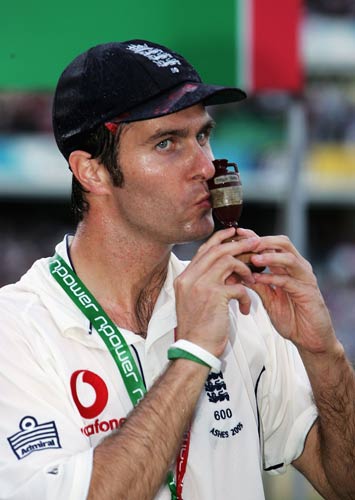The country owes Vaughan for Ashes triumph

Your support helps us to tell the story
From reproductive rights to climate change to Big Tech, The Independent is on the ground when the story is developing. Whether it's investigating the financials of Elon Musk's pro-Trump PAC or producing our latest documentary, 'The A Word', which shines a light on the American women fighting for reproductive rights, we know how important it is to parse out the facts from the messaging.
At such a critical moment in US history, we need reporters on the ground. Your donation allows us to keep sending journalists to speak to both sides of the story.
The Independent is trusted by Americans across the entire political spectrum. And unlike many other quality news outlets, we choose not to lock Americans out of our reporting and analysis with paywalls. We believe quality journalism should be available to everyone, paid for by those who can afford it.
Your support makes all the difference.England's Ashes triumph in 2005 will always be remembered for the intimidating bowling of Steve Harmison, the emergence of a batting superstar in Kevin Pietersen and the mercurial performances of Andrew Flintoff.
But the key to England's triumph was none of these.
It was the captaincy of Michael Vaughan, who today retired from cricket after being overlooked for the current series against Australia which starts in 10 days time.
What Vaughan achieved in that heady summer four years ago went to the core of sporting leadership.
He demanded respect with the down-to-earth manner in which he put hard work and meticulous preparation at the top of England's agenda.
He coaxed the best out of big egos, with intuitive bowling changes and imaginative field placings.
Most of all, Vaughan forged a sense of camaraderie in England's cricket team which they have struggled to emulate.
If it was not for his dodgy knees, those countless operations and his cruel luck then Vaughan almost certainly would have led England to more triumphs. Almost certainly he would still have been in charge for this summer's eagerly anticipated series.
But captains, even inspired ones such as Vaughan, cannot be carried in the modern game. And the truth is Vaughan, with no form and few runs for Yorkshire - just 147 in seven innings - had given the selectors no encouragement to take another chance on his fragile physique.
The irony is that the history books show that, statistically, Vaughan is England's greatest captain with 26 victories in 51 Tests as skipper.
That's six more than Peter May, eight more than Mike Brearley and 13 more than Mike Atherton.
Not that statistics tell the whole story.
Was Vaughan a better captain than Ray Illingworth, whose 12 England victories trail behind his total but who won them when the pickings were not so easy from emerging nations such as Bangladesh and Zimbabwe and when the West Indies at their mightiest ruled the game?
Was he better than May, who retained his talent as the most stylish of batsmen even when saddled with responsibility?
Was he better than Mike Brearley, whose 18 triumphs in 31 Tests, including seven series successes, notably the Botham Ashes of 1981, gives him a win ratio of 58%?
Comparisons are futile.
What is beyond doubt is that Vaughan was a fine leader of men, one who brought solidity and intelligence to the England team after taking over from Nasser Hussain in 2003. A fine batsman, too, with 18 Test centuries and 5,719 Test runs.
His value is perhaps best measured by the implosion of England in Australia when his knee injury forced him to sit out the Ashes return series and Flintoff's side turned glory of 16 months before into humiliating whitewash.
There was a composure about England when Vaughan was in charge. He was liked as well as respected, although there is no doubt he did benefit from the pioneering work on fitness and central contracts by former coach Duncan Fletcher.
Under Vaughan in 2004 the same players who had struggled under Hussain suddenly were unbeatable, winning 11 matches and drawing two, including an England record of eight consecutive victories.
It set the tone for the summer of 2005 and Flintoff and Pietersen and all that. By rights, they should be remembered as Vaughan's Ashes.
Join our commenting forum
Join thought-provoking conversations, follow other Independent readers and see their replies
Comments